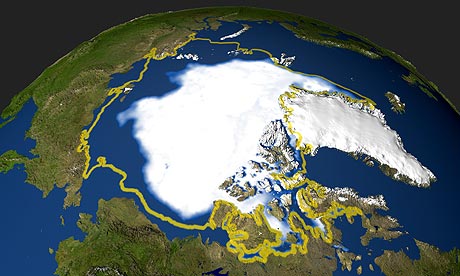Arctic needs protection from resource rush as ice melts, says UN
As melting ice makes exploration easier, human activity threatens wildlife and ecosystems

Arctic sea ice melt from Nasa. Photograph: HO/AFP/Getty Images
The Arctic needs to be better protected from a rush for natural resources as melting ice makes mineral and energy exploration easier, the United Nations' Environment Programme (UNEP) said.
The UNEP Year Book 2013 was released on Monday to accompany the opening of talks in Nairobi attended by environment ministers or senior officials from around 150 nations, aimed at making the world economy greener at a time of weak economic growth.
"What we are seeing is that the melting of ice is prompting a rush for exactly the fossil fuel resources that fuelled the melt in the first place," said Achim Steiner, U.N. Under-Secretary-General and UNEP Executive Director.
"As the UNEP Year Book 2013 points out, the rush to exploit these vast untapped reserves have consequences that must be carefully thought through by countries everywhere, given the global impacts and issues at stake."
Last September, Arctic sea ice reached its lowest level in the satellite record, which dates back to 1979, and scientists say there could be an ice-free summer by 2030-2040.
The melt is largely blamed on rising greenhouse gas emissions, short-lived pollutants such as soot, or black carbon, and variations in atmosphere and ocean currents.
The Greenland ice cap has also been melting, permafrost on the tundra has thawed and there is less snow on land and on glaciers.
As ice and snow retreats, more shipping routes are opened and access is easier for oil and gas exploration and mining companies. However, increased human activity could threaten the already fragile ecosystems and wildlife, UNEP said.
The U.S. Geological Survey estimates that 30 percent of the world's undiscovered natural gas and 15 percent of oil is in the Arctic. Several companies, including Russia's Rosneft, Norway's Statoil and U.S.-based Exxon Mobil are getting ready to drill in areas of melting sea ice, despite the risks, technological difficulties and costs.
Some countries have estimated that the Northern Sea Route would be turned into a shipping highway, with a 40-fold increase in shipping by 2020.
There is also likely to be a boom in fisheries. A widely predicted northward shift in sub-arctic fish species, including Atlantic and Pacific cod, is now being detected. It is estimated that fish catches in the high latitudes, including the Arctic, could increase by 30 to 70 percent by 2055.
The Arctic Council - made up of core members Canada, Denmark, Finland, Iceland, Norway, Russia, Sweden and the United States - has a crucial role to play in ensuring any resource exploitation is done responsibly, UNEP said.
The U.N. body advises that no steps to exploit the Arctic environment are taken without first assessing how activities would affect ecosystems and populations.
Cutting global greenhouse gas emissions, which are believed to contribute to rising global temperatures, should remain a top priority, UNEP said.
But additional action to curb regional emissions of short-lived pollutants such as black carbon should also be considered.
More research is also needed on the impacts of climate change in the region, and governments should adopt a long-term view of development in the Arctic, involving local people and other interested parties, UNEP said.
No hay comentarios:
Publicar un comentario